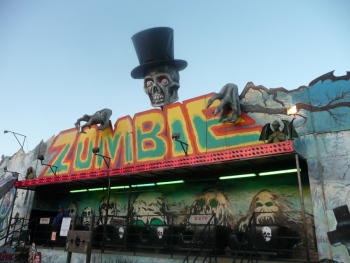16. to 13. Staring Into the Abyss
 David Antrobus Posted on
David Antrobus Posted on  Friday, February 7, 2014 at 7:48PM
Friday, February 7, 2014 at 7:48PM  13. Audition
13. Audition
Takashi Miike's masterpiece, in my opinion, and one of the greatest examples of "abuse horror," a term I literally just made up. But yeah, it's beautiful and creepy in equal measure, and when the torture occurs, it's unrelenting and unflinching, which I admire while at the same time wishing it wasn't. The best horror should never depict femininity as weakness, and this certainly doesn't even try. Not so much a feminist revenge flick as a subconscious reordering, a reckoning. Honestly, rather than listen to me spout off, stop right now, seek out this film, and watch it.
14. Don't Look Now
Whether you take Nicolas Roeg's piece of cinematic genius as a psychological depiction of how grief can undermine the deepest love, or whether you succumb to a supernatural interpretation, you will be unable to escape the cloying mood of sorrow, horror, and dread that pervades every crimson-tinged frame of this movie. Sutherland and Christie are peerless here, whether they are engaged in wonderfully carnal attempts to forget or are taking psychic leaps into a dark, arcane, almost pagan Venice. Creepiness and wrongness vie with a watery Renaissance city that still dreams darkly of ancient sins, murder, and illicit love amid its oily canals and murky piazzas, knowing we can never go back to the innocence of our past.
15. A Serbian Film
Right on cue, here comes the gore. And the awfulness. And Exhibit A in why so many people label the horror genre despicable and morally bankrupt. Because, trust me, this film goes places most people in the genre won't. It lacks all restraint and good taste, and yet... despite what its haters say, it's not without merit. It's true to itself, to its political vision, and to a kind of faux snuff aesthetic. Sure, the themes are appallingly bleak—in fact, some see its transgressive nature as a political statement in itself—but it's consistent in its stark brutality, as well as extremely, unforgettably upsetting. The word "relentless" is overused, but here it fits like a dirty, infected glove. In fact, "relentless and infected" perfectly encapsulates the effect this film has on its viewers—those who are still left at the very end, that is. This is why I come to horror. Not for trinkets but for dripping viscera, lost terror, and to be thoroughly disturbed. Hard to condemn something for which you seek. If you have the stomach for it, watch it, but know you probably won't ever have the luxury of forgetting it.
16. Monsters
By now, anyone foolish or bored enough to have been paying attention to my list might possibly have sensed a theme. Mood. Atmosphere. Dread. Disquiet. Don't get me wrong, I can be up there with the gorehounds, sometimes, reveling in the spectacular and the viscerally loathsome, but deep down I simply love the eldritch caress of light and shadow, of ambience, muted colour, subtlety, creepiness... and true fear. Not always, but for the purposes of this list, for sure. And you be sure to seek out the right version—a low-budget 2010 UK film set in Mexico. Again, it's probably best described as science fiction, but for me, the apocalyptic background, in which the compromised horizons crackle with anxiety, portents, and bad arrivals, works better on a horror level. And the story itself—of people desperate to find their way home against increasingly poor odds—is heartbreakingly human.






